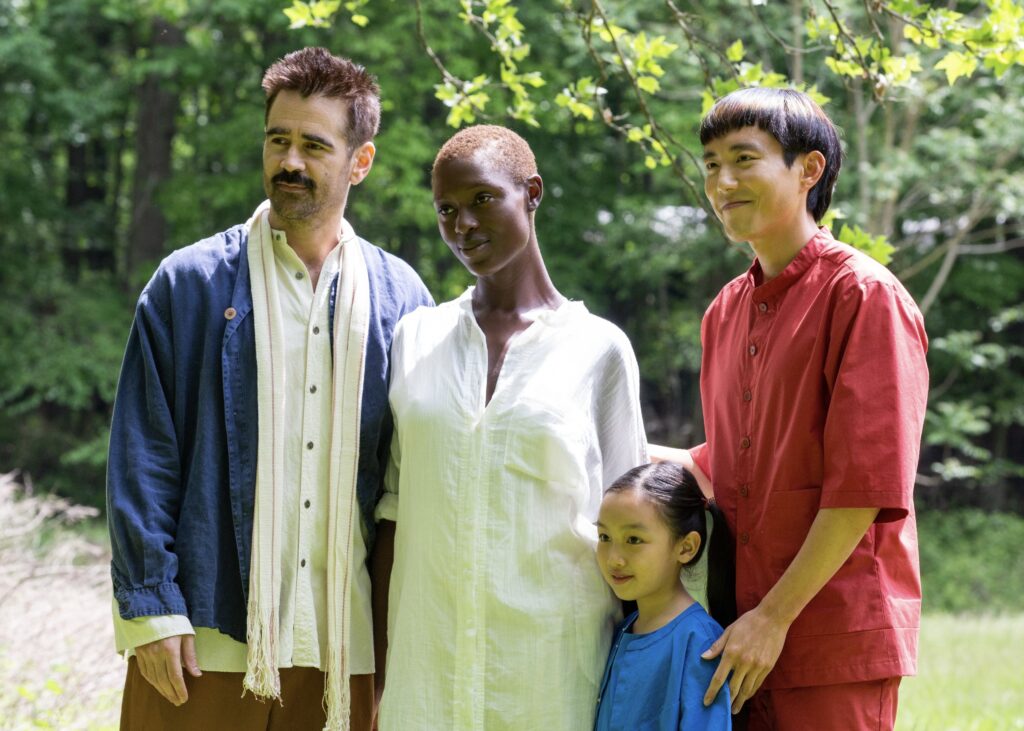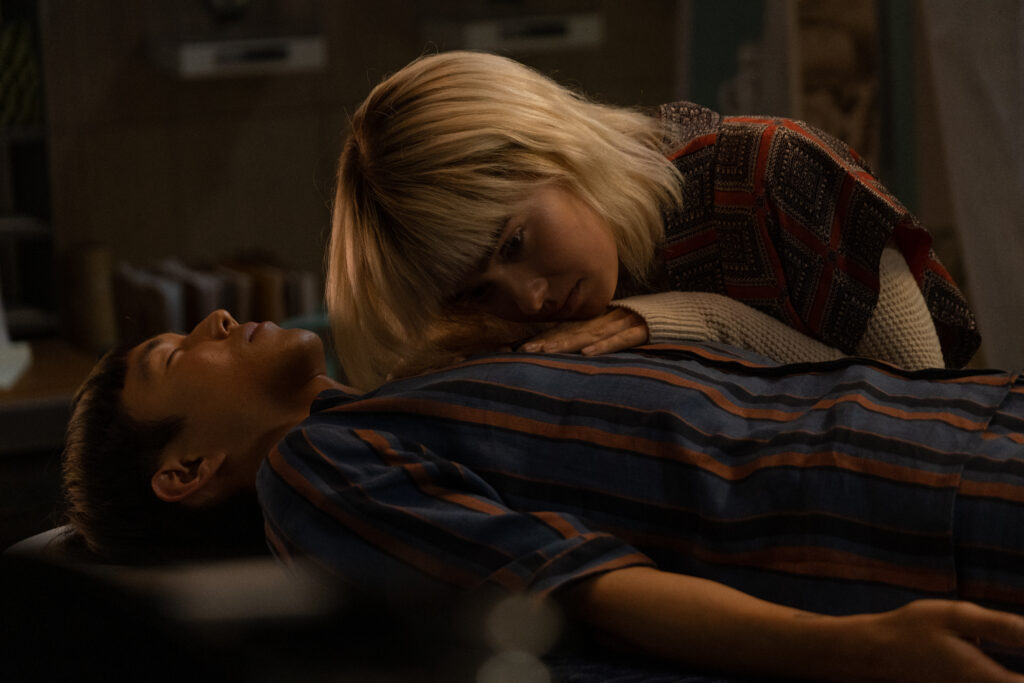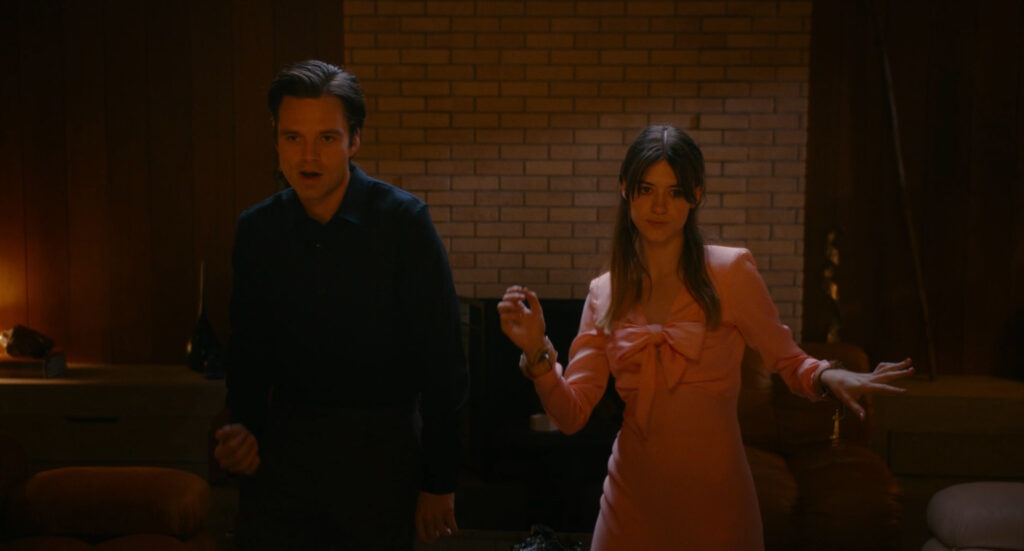May 26, 2023
by Carla Hay
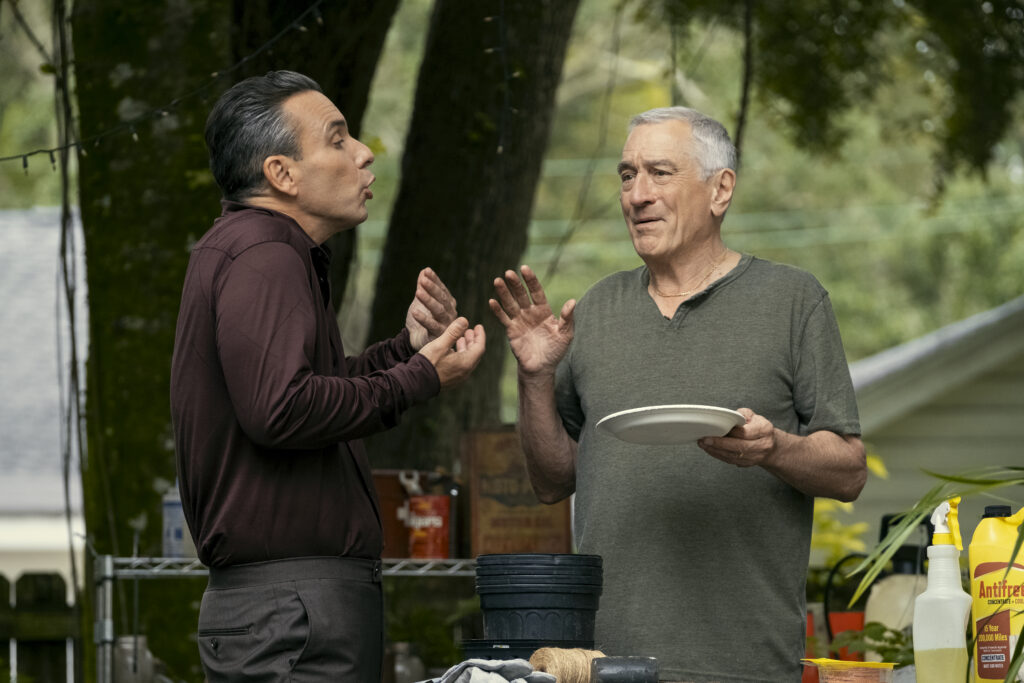
Directed by Laura Terruso
Some language in Italian with no subtitles
Culture Representation: Taking place in Illinois and in Virginia, the comedy film “About My Father” features a nearly all-white cast of characters (with a few Latinos and black people) representing the working-class, middle-class and wealthy.
Culture Clash: An Italian American hotel manager in Chicago travels with artist girlfriend and his hair stylist father to Virginia, to meet the girlfriend’s Anglo Saxon wealthy family, and various uncomfortable situations occur because of different ethnic identities and socioeconomic classes.
Culture Audience: “About My Father” will appeal primarily to people who are fans of the movie’s headliners and predictably subpar comedies about tension-filled family gatherings.
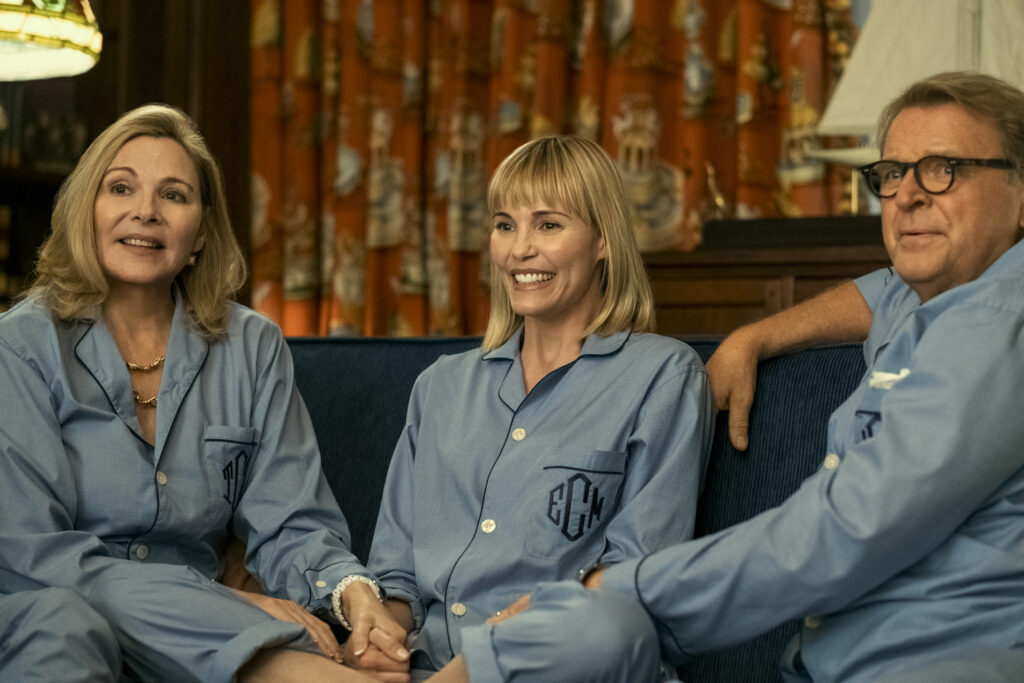
“About My Father” is just a mishmash of scenes that look like stale leftovers from a second-rate sitcom. Robert De Niro is doing another “grumpy old man” character that he keeps doing in awful comedies that fail to match the quality of “Meet the Parents.” De Niro has not made a really good comedy film since 2000’s “Meet the Parents,” in which he co-starred as a stern potential father-in-law to a neurotic male nurse (played by Ben Stiller), who meets this patriarch and other would-be in-laws for the first time during a family gathering.
It’s perhaps no coincidence that “About My Father” (directed by Laura Terruso) is a weak imitation of “Meet the Parents,” but with no real charm and with characters that mostly look very phony. “About My Father” has so many of same plot points and gags as “Meet the Parents,” the screenwriters of “About My Father” should be ashamed to call the screenplay “original.” Sebastian Maniscalco (who stars as the nervous bachelor in “About My Father”) and Austen Earl co-wrote the shallow and derivative “About My Father” screenplay. “About My Father” has such a lack of imagination, Maniscalco portrays a character who has the same name as he does.
Just like in “Meet the Parents,” the plot of “About My Father” is about an insecure American man in Chicago who meets the conservative, wealthier parents of his blonde, thin and pretty girlfriend at the parents’ family home. In “Meet the Parents,” the bachelor is Jewish and works as a nurse. In “About My Father,” the bachelor is of Italian heritage and works as an average-level hotel manager. Both movies use various ethnic and socioeconomic stereotypes as fuel for the comedy. The bachelor goes back and forth between being embarrassed and being proudly defensive about coming from a working-class family. He tries very hard to impress his more sophisticated potential in-laws.
The anxious bachelor hopes to get the parents’ approval because he wants to propose marriage to his girlfriend. Several wacky incidents then ensue involving the family playing competitive games with each other; pet animals that are liked or disliked by people at this gathering; and physical mishaps that cause tension and embarrassment. “Meet the Parents” and “About My Father” both have the girlfriend’s annoying siblings make the bachelor uncomfortable.
In “About My Father,” you can do a countdown to a lot of the predictable comedy clichés that have been in dozens of other movies. There’s even a “race against time” scene of someone trying catch up to someone else who’s about to leave on an airplane. The main plot difference between the two movies is that in “About My Father,” the bachelor brings his father along for this family visit. As expected in a formulaic comedy such as “About My Father,” this dad is an outspoken loose cannon who will clash with the pretentious and snobby family who’s hosting this gathering.
“About My Father” has somewhat irritating voiceover narration from the character of Sebastian throughout the movie. In the beginning of the film, Sebastian says that his family is originally from the Italian region of Sicily and has a very strong work ethic. His father Salvo (played by De Niro) immigrated from Sicily and comes from “a long line of Sicilian hairstylists.” Even though Salvo is well past retirement age, he still works in his own hair salon, where his customers (at least those shown in the movie) are middle-aged women who laugh at his unfunny jokes.
Sebastian (who has no siblings) is a first-generation Italian American. Sebastian’s mother is talked about but never shown in any flashbacks. Near the beginning of the movie, it’s mentioned that Sebastian’s mother has been dead for about a year. Sebastian and Salvo have had a very close father-son relationship since Sebastian was a child. And now that Salvo is a widower, Sebastian feels obligated to stay close to his lonely father. Salvo and Sebastian live together.
Salvo and Sebastian’s relationship is a weird mix of co-dependent and macho. On the one hand, Salvo acts like Sebastian is being a disloyal son for having a life outside of being Salvo’s closest friend. (And to be clear: Salvo really has no other friends.) On the other hand, Salvo believes that certain things make men look like “sissies” and “wimps,” such as crying, or father and sons hugging each other.
Sebastian and Salvo have a ritual of spraying cologne on themselves before they go to sleep. It’s supposed to be one of the funny “gags” in the movie, but it just falls flat. Sebastian says in a voiceover: “At bedtime, our room smelled like an Uber [car] in Las Vegas.” Get used to this type of dreadful joke in “About My Father,” because the movie is full of these unfunny comments.
Sebastian is in a loving relationship with his cheerful and perky girlfriend Eleanor “Ellie” Collins (played by Leslie Bibb), who comes from a wealthy family in Virginia. Ellie’s ancestors were among the English settlers who came over to the future United States on the historic Mayflower voyage of 1620. Ellie is an artist whose specialty is in painting abstract art. An early scene in “About My Father” shows Ellie and Sebastian at a gallery exhibit for Ellie’s art. Sebastian and Ellie joke that one of her paintings looks like it could be a vagina, except when the painting is turned horizontally. That’s what’s supposed to pass as “comedy” in this lackluster film.
In the voiceover narration, Sebastian describes Ellie as his “complete opposite” and his “dream woman.” Sebastian also mentions that Ellie introduced him to things such as sunlight coming into bedroom windows, daytime naps, avocado facials and smiling. There’s even a montage in the movie showing Sebastian grimacing, as he “trains” himself to smile more. Viewers will be grimacing for different reasons, as this movie strains to come up with funny lines of dialogue.
Ellie invites Sebastian to meet her family in Virginia, for a Fourth of July holiday weekend. (“About My Father” was actually filmed in Louisiana and Alabama.) Sebastian think this visit is a great idea, until Salvo starts whining about how the trip would mean that Salvo will be left home alone. Salvo also doesn’t think that Sebastian will fit in well with Ellie’s family. Sebastian tells Ellie he won’t go on the trip because he doesn’t want to leave Salvo at home alone, but then Ellie says that Salvo is invited too.
However, Sebastian doesn’t want Salvo to meet Ellie’s family, because Sebastian is sure that Salvo will be a complete embarrassment. Sebastian wants to propose to Ellie with the engagement ring that was owned by Salvo’s deceased mother. Salvo won’t give Sebastian this ring unless Salvo meets and approves of Ellie’s family.
After much hemming and hawing back and forth, Salvo ends up going on the trip with Sebastian and Ellie to the Collins family estate. They take a private plane to a private air strip, where they are greeted by Ellie’s spoiled, obnoxious and hard-partying older brother Williams Collins XIII (played by Anders Holm), whose nickname is Lucky. Sebastian, Salvo and Ellie then go in a helicopter piloted by Lucky to the vast summer home owned by the Collins family. Predictably, one of the helicopter passengers (Sebastian) gets airsick.
At the Collins family estate, Salvo and Sebastian meet Ellie’s parents and younger brother. Ellie’s father William Collins XII (played by David Rasche), whose nickname is Bill, is a luxury hotel mogul in charge of the family’s Collins Hotel Group empire. Bill is friendly in an elitist way. He loves to name drop and brag about high-priced items that he’s bought, while trying (and failing) to look humble.
Ellie’s mother Tigger Collins (played by Kim Cattrall) is a hard-driving and prickly U.S. senator who is used to getting her way. Ellie has warned Sebastian that Tigger will be much harder to please than Bill. Tigger is essentially the type of character that De Niro played in “Meet the Parents”: a domineering authority figure who intimidates the visitors.
Ellie’s younger brother Doug (played by Brett Dier) is the family’s spaced-out weirdo, who walks around dressed like a hippie cult member. Doug rambles about things that he thinks are “enlightening,” such as chakras, cleansing the energy in a room, and how a certain organic food affects his bowel movements. Doug’s family members treat him like a harmless eccentric.
Lucky works in the family’s hotel business. Doug doesn’t seem to work at all. Out of all three siblings, Ellie is clearly the favorite child of their parents, who treat Ellie like a pampered princess. When she’s around her parents, Ellie seems to revert back to acting like a teenager, which should be a “red flag” warning sign for someone who’s in a romance with her. However, immature Sebastian has got enough family issues of his own, and he gets very caught up in trying to impress Ellie’s parents.
The Collins family has peacocks that Ellie says are the family mascots. These peacocks walk around the property wherever they want, mostly outside. Salvo dislikes peacocks and says that they are bad luck. You know where this is going, of course. In “Meet the Parents,” the family pet that caused conflicts was a cat, which was adored by the patriarch but disliked by the visiting bachelor.
“About My Father” has mostly unremarkable acting by cast members trying very hard to be funny when saying cringeworthy lines and depicting even more cringeworthy scenarios. Cattrall fares the best in some of the slapstick comedy, while De Niro is just going through the motions in rehashing the same persona he does in nearly all of his comedies since “Meet the Parents.”
Maniscalco became famous as a stand-up comedian, but he can’t carry this comedy film with the leading-man qualities required for this role. His smirking Sebastian character is both hollow and dull, reduced to nothing but idiotic quips and hammy facial expressions. The direction and writing for “About My Father” look very outdated, like a 1990s movie that was made for a third-tier cable TV network.
“About My Father” might elicit a few chuckles from viewers. A scene that shows a brief flash of mildly amusing banter is when Sebastian and Salvo privately rant to each other about how pompous Tigger and Bill are about their wealth. But watching this disappointing movie dud is like being stuck in a room full of comedians using other people’s well-known and tired jokes, while the comedians try desperately to convince the audience that what they’re watching is fresh and original.
Lionsgate released “About My Father” in U.S. cinemas on May 26, 2023.

